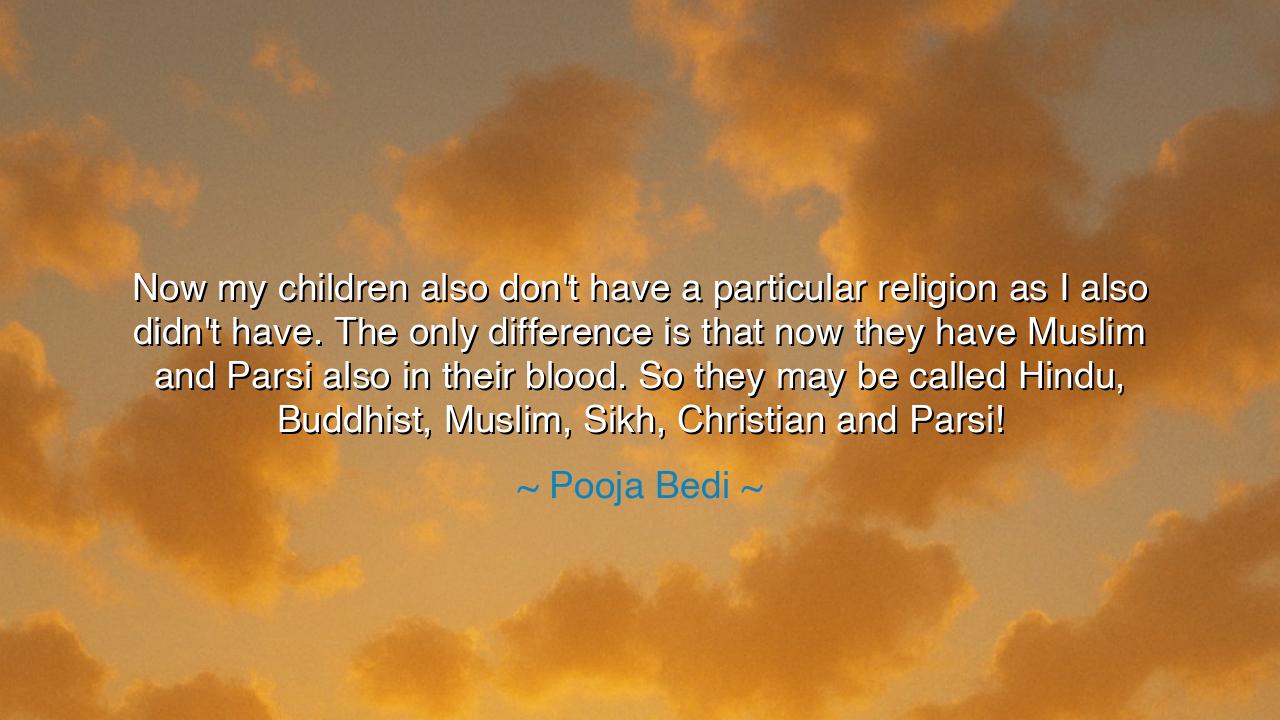
Now my children also don't have a particular religion as I also
Now my children also don't have a particular religion as I also didn't have. The only difference is that now they have Muslim and Parsi also in their blood. So they may be called Hindu, Buddhist, Muslim, Sikh, Christian and Parsi!






Hear, O listeners, the words of Pooja Bedi, who declared: “Now my children also don't have a particular religion as I also didn't have. The only difference is that now they have Muslim and Parsi also in their blood. So they may be called Hindu, Buddhist, Muslim, Sikh, Christian and Parsi!” In this saying, she reveals the beauty of plurality, the truth that identity is not confined to a single box, and that the spirit of humanity transcends the narrow walls of division. Hers is a vision of unity, born not of theory but of life itself, carried within the lineage of her children.
The origin of these words lies in Bedi’s own life and family, shaped by India’s vast tapestry of traditions. She herself was raised without a strict religious mold, in a land where Hindu, Muslim, Christian, Sikh, Buddhist, and Parsi have walked side by side for centuries—sometimes in harmony, sometimes in conflict. By marrying across boundaries and raising children with blood from many lineages, she became a living testimony to India’s syncretic heritage. Her statement is less a boast than a proclamation of belonging: her children are heirs not to one faith, but to all.
Consider the meaning of her words. To say one may be called many religions is not to mock faith, but to honor its diversity. It is to say that within the human heart flows a river deeper than labels, carrying stories, prayers, and traditions that no one creed can fully contain. For are not all faiths, in their essence, seeking the same truth—connection with the divine, compassion toward others, meaning in the midst of suffering? To embody many is to live as a bridge, a reminder that we are not enemies across boundaries, but family across centuries.
History offers us proof of this vision. In Mughal India, Emperor Akbar the Great sought to unite his people by respecting all traditions. Though born a Muslim, he welcomed Hindus, Christians, Parsis, and others to his court, even creating a “House of Worship” where different faiths could debate as equals. His dream was not of one faith replacing another, but of all shining together. Though his “Din-i Ilahi” did not last, the spirit of his vision endures in stories such as Bedi’s, where children inherit multiple lineages and embody unity in their very blood.
And let us recall too Mahatma Gandhi, who, though born a Hindu, drew strength from the Sermon on the Mount, reverence from the Qur’an, and discipline from Buddhist and Jain traditions. He saw himself not as one closed identity, but as one who carried the essence of many. His life showed that embracing the wisdom of diverse faiths does not weaken one’s spirit—it strengthens it, making it broad enough to shelter all.
The lesson for us, then, is profound: do not let religion divide where it was meant to unite. See the shared humanity in all traditions, for your neighbor’s prayer is not so different from your own. Honor your lineage, but also open your heart to the richness of others. For when bloodlines and histories merge, as in the story of Bedi’s children, we are reminded that we are all kin beneath the skin, all seekers beneath the sky.
Practical wisdom follows: teach your children respect for all faiths, whether they belong to one or many. Celebrate diversity not as confusion, but as abundance. Reject the pride of exclusivity, for truth is too vast to be caged by one name alone. And above all, remember that to live as though you are Hindu, Muslim, Sikh, Christian, Buddhist, and Parsi together is to live as a child of humanity itself.
Thus let the words of Pooja Bedi endure: “My children may be called Hindu, Buddhist, Muslim, Sikh, Christian, and Parsi.” For in them lies the hope of a future where divisions fade, and where mankind, at last, recognizes that beneath the many names of God, there is but one light, shining upon us all.






AAdministratorAdministrator
Welcome, honored guests. Please leave a comment, we will respond soon